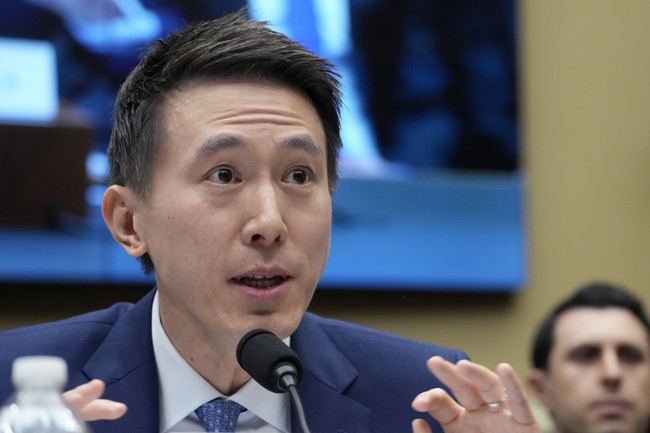
There’s a new bipartisan bill making its way through congress which, if passed, would force TikTok’s Chinese owner Byte Dance to divest itself of the company. The bill seems primarily aimed at TikTok but could in theory apply to any social media company owned by a foreign adversary. Under the bill, any company determined by US intelligence agencies to be under the control of a country like China, Russia or Iran would have 180 days to divest. Failure to do so would result in a ban from US app stores.
Of course this isn’t the first time congress has talked about banning TikTok but this time the effort seems to have a lot of bipartisan support including from the White House.
The U.S. House Committee on Energy and Commerce on Thursday is expected to vote on legislation giving China’s ByteDance six months to divest from short video app TikTok or face a U.S. ban.
Committee approval would set up a vote by U.S. House of Representatives that represents the first significant momentum for a U.S. crackdown on TikTok, which about 170 million U.S. users…
White House press secretary Karine Jean-Pierre on Wednesday praised the proposal, saying the administration wants “to see this bill get done so it can get to the president’s desk” saying it supports addressing “the threat posed by certain technology services operating in the United States.”
TikTok itself is clearly feeling the pressure. Yesterday it sent a message to users asking them to call members of congress.
TikTok sent users in the US a push notification on Wednesday, warning that “Congress is planning a total ban of TikTok” that would “[strip] 170 million Americans of their Constitutional right to free expression.” The page says that a ban would “damage millions of businesses, destroy the livelihoods of countless creators across the country, and deny artists an audience.” The alert includes a way for users to find their representative and call their office…
TikTok has previously appealed to its users as political pressure has mounted. In 2023, as support for a different bill was gaining steam, TikTok CEO Shou Zi Chew appeared in a video posted to the official TikTok profile to warn users and ask them to essentially sound off in the comments.
TikTok has been fighting this battle for a few years now and directing users to call congress is just their latest gambit. Last March the company set up a “Transparency Center” in Los Angeles and invited a bunch of social media influencers and tech journalists to help them make their case.
There’s reason to think this bill would be challenged in court even if it passed and was signed by the president. Last year the state of Montana banned TikTok:
Gov. Greg Gianforte signed Senate Bill 419 on Wednesday, saying he wants to protect the state’s residents’ private information from being compromised. He pointed to the Chinese government as a potential threat.
“The Chinese Communist Party using TikTok to spy on Americans, violate their privacy, and collect their personal, private, and sensitive information is well-documented,” Gov. Gianforte said…
According to the measure in Montana, platforms that offer the app on their marketplaces, such as the Google Play Store and the Apple App Store, will be subjected to fines up to $10,000 a day for violations.
That law was supposed to take effect in January of 2024 but last November a federal judge blocked it with a preliminary injunction.
U.S. District Judge Donald Molloy said Montana’s TikTok ban “oversteps state power” and “likely violates the First Amendment.”
Molloy wrote that though officials in Montana have defended the law as an attempt to protect consumers in the state, there is “little doubt that Montana’s legislature and Attorney General were more interested in targeting China’s ostensible role in TikTok than with protecting Montana consumers,” the judge wrote.
Montana, as a state, does not have authority over foreign affairs, Molloy said, but even still, he found the national security case presented against TikTok unconvincing, writing that if anything the Montana law had a “pervasive undertone of anti-Chinese sentiment.”
Judge Molloy sounds like a blithering idiot who doesn’t know anything about China, but his injunction killed the ban until a full trial on the issue could take place later this year.
On January 2, Montana appealed that decision to the 9th Circuit Court of Appeals. Even if the appeals court upholds Judge Molloy’s decision and even if a trial eventually winds up undoing the Montana law, there does seem to be some room for the federal government to act in ways an individual state can’t (according to this judge). In other words, an ACLU lawsuit aimed at a federal ban passed by congress and signed by the president might have a much steeper hill to climb.
Of course Americans do have a right to free speech, but the US government doesn’t have to allow a Chinese owned app to become the platform for that speech, especially where there is evidence Chinese engineers can look at the data of US users at will. I suspect some progressive tech journalists would rather have a Chinese app filling this role than Elon Musk’s X, though I doubt any of them would admit it.
It sounds like TikTok’s plan to flood congress with calls is working. What does that tell us?
It’s almost like TikTok has powerful influence on the American public and can shape their political behavior! https://t.co/emxzsf1Exb
— Peter Hamby (@PeterHamby) March 7, 2024










